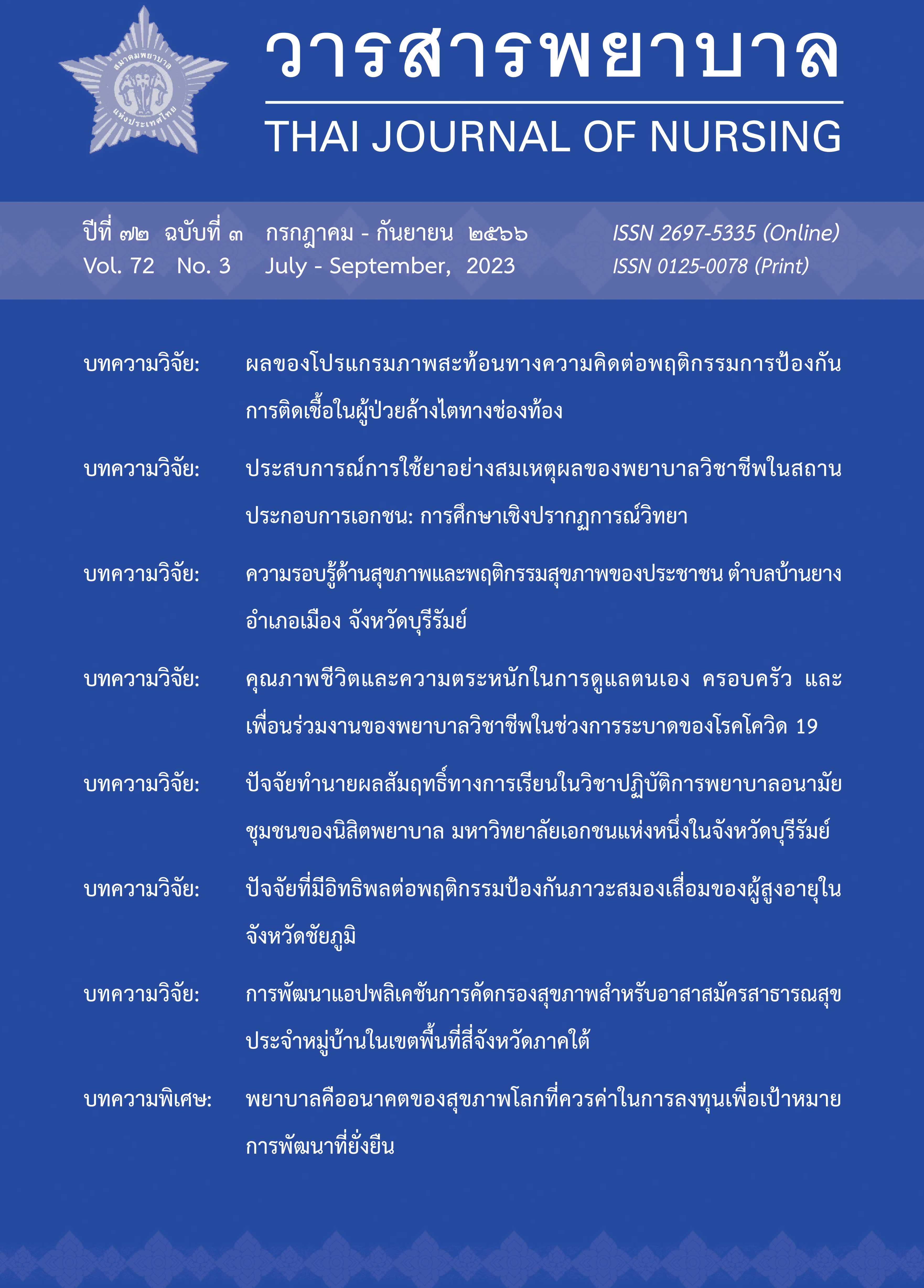Rational drug use experiences of professional nurses in private factories: A phenomenological study
Main Article Content
Abstract
This phenomenological qualitative research aimed to explore the meaning and experience of rational drug use among professional nurses in private factories. Twenty informants were selected using purposive and snowball sampling methods. The research instrument included semi-structure interview which was verified by five experts. Data were collected using in-depth interview method. Data were analyzed using content analysis. As the results found that rational drug use experiences caused by physical readiness, organizational structure, professional peers, learning, practicing, and using effective communication. The process of generating experiences consisted of the effective job forwarding, work preparation, past history and health assessment, prescribing rational drug use and safety, health education for clients, following up, and evaluating drug side effects, referral for treatment, and effective drug administration. The results of rational drug use included the explicit knowledge, confidence in practices, self-esteem, compassion satisfaction, and increasing professional competency. The core experience of this study was perceiving self-efficacy and self-esteem.
Article Details

This work is licensed under a Creative Commons Attribution-NonCommercial-NoDerivatives 4.0 International License.
References
กระทรวงแรงงาน. (2548). คำชี้แจงกระทรวงแรงงานเรื่อง กฎกระทรวงว่าด้วยการจัดสวัสดิการในสถานประกอบกิจการ พ.ศ.2548. http://www3.mol.go.th/content/63240/1505811177
กฎกระทรวงว่าด้วยการจัดสวัสดิการในสถานประกอบกิจการ พ.ศ. 2548. (2548, 29 มีนาคม). ราชกิจจานุเบกษา. เล่ม 122 ตอนที่ 29 ก. หน้า 14–18.
คณะกรรมการจัดทำรายงานระบบยาของประเทศไทย. (2563). ระบบยาของประเทศไทย 2563. สถาบันวิจัยระบบสาธารณสุข. https://kb.hsri.or.th/dspace/handle/11228/5234
พิสนธิ์ จงตระกูล. (2561). การใช้ยาอย่างสมเหตุผลใน primary care (พิมพ์ครั้งที่ 12). วนิดาการพิมพ์.
ภาวิดา พุทธิขันธ์, กนกเลขา สุวรรณพงษ์, นฤมล อังคศิริศักดิ์, กมลรัตน์ เทอร์เนอ, และ สุนทราวดี เธียรพิเชษฐ.(2563). การประเมินนโยบายการใช้ยาอย่างสมเหตุผลในหลักสูตรพยาบาลศาสตรบัณฑิต และสมรรถนะการใช้ยาอย่างสมเหตุผลของอาจารย์พยาบาล. วารสารพยาบาลสภากาชาดไทย, 13(1), 282-301.
วรัมพร ดอกเคน. (2560). การใช้ยาแก้ปวดของประชาชนจากชุมชนจันทึกตำบลหนองสาหร่าย อำเภอปากช่อง จังหวัดนครราชสีมา. วารสารการพัฒนาสุขภาพชุมชน มหาวิทยาลัยขอนแก่น, 5(3), 475-486.
สภาการพยาบาล. (2560). บทสรุปรูปแบบการบรรจุหลักสูตรการใช้ยาอย่างสมเหตุผลในหลักสูตรพยาบาลศาสตรบัณฑิต. https://www.tnmc.or.th/images/userfiles/files/summarymed.pdf
Bhattacharya, S., Kennedy, M., Miguel, C., Tröger, A., Hofmann, S. G., & Cuijpers, P. (2023). Effect of psychotherapy for adult depression on self-esteem: A systematic review and meta-analysis. Journal of Affective Disorder, 15(325), 572-581.
doi: 10.1016/j.jad.2023.01.047
Birara, D., & Kassa, B. (2020). Rational drug-use evaluation based on World Health Organization core drug-use indicators in a tertiary referral hospital, Northest Etiopia: A cross-sectional study. Drug Healthcare and Patient Safety, 16(12), 15-21.
doi: 10.2147/DHPS.S237021
Donabedian, A. (2003). An introduction to quality assurance in health care. Oxford University Press.
Intahphuak, S., Lorga, T., & Tipwareerom, W. (2022). Community health nurses’ perspective on the introduced rational drug use policy in primary care settings in Thailand: A descriptive qualitative study. Tropical Medicine and Infectious Disease, 7(10), 304. doi: 10.3390/tropicalmed7100304.
Van Manen, M. (1990). Researching lived experience: Human science for an action sensitive pedagogy. SUNY Press.


